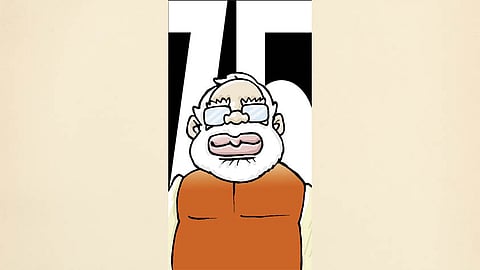Modi@75
Narendra Modi, one of India’s longest-serving prime ministers, will, a few days from now, be celebrating his 75th birthday. A platinum birthday of a thrice-elected prime minister is undoubtedly a cause for all-round celebration; it is also a proud moment for Indians at large.
A birthday is also a time to assess the achievements and accomplishments, as also the shortcomings, of the leader. Modi has been rendering public service as a leader for nearly 25 years – first as the chief minister of Gujarat from 2001, and thereafter as the prime minister since 2014. Even his staunchest critics would not contest the claim that Modi is a great statesman – a statesman with a clear vision and the foresight to make India Viksit Bharat by 2047.
He has put India firmly on the global map and taken bold steps to propel the country’s all-round growth across economy, culture, and inclusivity, both in India and overseas. Vasudhaiva Kutumbakam – the world is one family – was put into practice during Covid times, when India manufactured millions of vaccines for needy countries. Amongst several growth initiatives, the introduction of GST, UPI,
Make in India and Start-up India come to mind. Spreading yoga and creating an International Day of Yoga was but one of several cultural steps. His focus on inclusivity was evident from his first term itself, when he introduced Jan Dhan Yojana to ensure that the full benefit of the government’s largesse reached directly to individuals, bypassing intermediaries.
What history will probably remember him for most is the abolition of Article 370, abrogating the special rights of Jammu and Kashmir, which were temporary in nature but had threatened to become permanent over the years. The reorganisation bill passed a day later, on 6 August 2019, bifurcating the region into three separate union territories – Ladakh, Kashmir, and Jammu – also allowed the full benefits of the Union to be passed on to the people in these UTs. His second biggest accomplishment was taking Pakistan head-on.
The Battle of Uri and Operation Sindoor were displays of might that showed even elephants can run.
His emphasis on creating a vibrant defence front was evident in the importance given to defence companies in both the public and private sectors. Like a good CEO, Modi spent the initial years of his first term building relations with countries, many of which had not seen any Indian leader step on their soil for decades. His emphasis, ever since he became a sambhak pracharak (regional organiser) in 1978, was always “country above everything else”. He stood up to the aggressive posturing of Donald Trump’s government when it raised punitive tariffs on India for buying Russian crude. Modi could easily pick up the phone to talk to leaders of the USA, Russia, UK, France, Japan, Israel, Ukraine, or Brazil. This was more than just his charisma, which, in any case, is all-pervasive. His knack for choosing the right people and giving them the freedom to do their job saw Modi build a strong team to carry out both the stated and unstated agenda.
It would be futile to compare Modi with Jawaharlal Nehru or other great statesmen of the country. It was a different era, with clouds of socialism dominating the landscape. Nehru was credited with making India a Republic and drawing up Five-Year Plans to ensure equitable regional growth. He also had a vision of making India great and invested in building relationships across countries. He created some of the large PSUs whose benefits are still being reaped today – be it Indian Oil, ONGC, or several others. Modi, by contrast, has had to operate in a multipolar world, amidst war-torn economies. He now has to play the part of a peacemaker, including with the US government.
Undoubtedly, both made mistakes – Nehru in trusting China, leading to the 1962 war with an unprepared India; Modi in his demonetisation drive, which yielded few gains due to corrupt bankers allowing large conversions of unaccounted cash. While Nehru was an idealist, Modi is pragmatic and is known for his execution skills, ensuring the completion of mega projects. Modi has ensured India a place in the world’s top four economies and laid a glide path for making India a developed country by 2047. Whether India becomes number three by 2047 or not is immaterial. History will remember Modi for thinking big and laying the foundation to enable India to achieve it.

